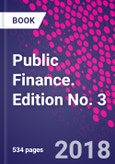Public Finance remains the premier textbook on the normative theory of government policy, with the third edition propelling into the twenty-first century its examination of what government ought to be doing instead of what it is doing.
The welfare aspects of public economics receive extensively renewed examination in this third edition. With four new chapters and other significant revisions, it presents detailed and comprehensive coverage of theoretical literature, empirical work, environmental issues, social insurance, behavioral economics, and international tax issues. With increased emphasis on the European Union, it is rigid enough for use by PhDs while being accessible to students less well trained in math.
- Moves skillfully from explaining normative theory to applying it in mathematically compact and precise terms
- Adds new chapters on social insurance, medical care, social security pensions, behavioral public economics, and international public finance
- Includes new pedagogical supplements, including end-of-chapter questions and answers
- Emphasizes European examples
Table of Contents
Part I: Introduction: The Content and Methodology of Public Sector Theory 1. Introduction to Normative Public Sector Theory 2. A General Equilibrium Model for Public Sector Analysis 3. First-Best and Second-Best Analysis and the Political Economy of Public Sector Economics
Part II: The Theory of Public Expenditures and Taxation-First-Best Analysis 4. The Social Welfare Function in Policy Analysis 5. The Problem of Externalities--An Overview 6. Consumption Externalities 7. Production Externalities 8. Global Warming: An Application of Externality Theory 9. The Theory of Decreasing Cost Production 10. The First-Best Theory of Taxation 11. Applying First-Best Principles of Taxation-What to Tax and How
Part III: The Theory of Public Expenditures and Taxation: Second-Best Analysis 12. Introduction to Second-Best Analysis 13. The Second-Best Theory of Taxation in One-Consumer Economies with Linear Production Technology 14. The Second-Best Theory of Taxation with General Production Technologies and Many Consumers 15. Taxation Under Asymmetric Information 16. The Theory and Measurement of Tax Incidence 17. Expenditure Incidence and Economy-Wide Incidence Studies 18. The Second-Best Theory of Public Expenditures: Overview 19. Transfer Payments and Private Information 20. Social Insurance: Medical Care 21. Social Insurance: Social Security 22. Externalities in a Second-Best Environment 23. Decreasing Costs and the Theory of the Second-Best-The Boiteux Problem 24. General Production Rules in a Second-Best Environment 25. Behavioral Public Sector Economics
Part IV: Fiscal Federalism and International Public Finance 26. Optimal Federalism: Sorting the Functions of Government Within the Fiscal Hierarchy 27. Optimal Federalism: The Sorting of People within the Fiscal Hierarchy 28. The Role of Grants-in-Aid in a Federalist System of Governments 29. International Public Finance
Authors
Tresch, Richard W.Professor Richard W. Tresch earned a bachelor's degree from Williams College in 1965 and a doctorate in economics in 1973 from Massachusetts Institute of Technology, where he was a teaching assistant prior to his arrival at Boston College. He joined the Boston College faculty in 1969 and throughout his 43-year career has served as Chairman of the Department of Economics, Director of Graduate Studies, and Director of Undergraduate Studies.
In 1996, chosen as Massachusetts Professor of the Year by the Carnegie Foundation for the Advancement of Teaching. He was one of 585 national entrants in the foundation's US Professors of the Year Program, which salutes outstanding undergraduate instructors; its award is recognized as one of the most prestigious honors bestowed upon professors. "I am quite humbled by the award, and extremely grateful to the Carnegie Foundation," Tresch said. "The greatest honor, however, is to have been nominated by Boston College. There are so many good teachers here and to be chosen to represent them in the program is something I truly value."
A member of the American Economic Association, Tresch served on the board of editors for the American Economic Review, and has contributed to New England Journal of Business and Economics and Public Finance. He is the editor of a four-volume major reference work on public sector economics.
The third edition on his textbook, Public Finance: A Normative Theory publishes in November, 2014.








